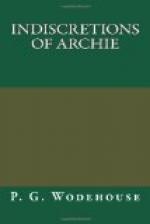“Yes?” said Archie doubtfully. “Well, you know, I heard him interviewing that chappie behind the desk this morning, who works like the dickens from early morn to dewy eve, on the subject of a mistake in his figures; and, if he loved him, he dissembled it all right. Of course, I admit that so far I haven’t been one of the toilers, but the dashed difficult thing is to know how to start. I’m nosing round, but the openings for a bright young man seem so scarce.”
“Well, keep on trying. I feel sure that, if you could only find something to do, it doesn’t matter what, father would be quite different.”
It was possibly the dazzling prospect of making Mr. Brewster quite different that stimulated Archie. He was strongly of the opinion that any change in his father-in-law must inevitably be for the better. A chance meeting with James B. Wheeler, the artist, at the Pen-and-Ink Club seemed to open the way.
To a visitor to New York who has the ability to make himself liked it almost appears as though the leading industry in that city was the issuing of two-weeks’ invitation-cards to clubs. Archie since his arrival had been showered with these pleasant evidences of his popularity; and he was now an honorary member of so many clubs of various kinds that he had not time to go to them all. There were the fashionable clubs along Fifth Avenue to which his friend Reggie van Tuyl, son of his Florida hostess, had introduced him. There were the businessmen’s clubs of which he was made free by more solid citizens. And, best of all, there were the Lambs’, the Players’, the Friars’, the Coffee-House, the Pen-and-Ink,—and the other resorts of the artist, the author, the actor, and the Bohemian. It was in these that Archie spent most of his time, and it was here that he made the acquaintance of J. B. Wheeler, the popular illustrator.
To Mr. Wheeler, over a friendly lunch, Archie had been confiding some of his ambitions to qualify as the hero of one of the Get-on-or-get-out-young-man-step-lively-books.
“You want a job?” said Mr. Wheeler.
“I want a job,” said Archie.
Mr. Wheeler consumed eight fried potatoes in quick succession. He was an able trencherman.
“I always looked on you as one of our leading lilies of the field,” he said. “Why this anxiety to toil and spin?”
“Well, my wife, you know, seems to think it might put me one-up with the jolly old dad if I did something.”
“And you’re not particular what you do, so long as it has the outer aspect of work?”
“Anything in the world, laddie, anything in the world.”
“Then come and pose for a picture I’m doing,” said J. B. Wheeler. “It’s for a magazine cover. You’re just the model I want, and I’ll pay you at the usual rates. Is it a go?”
“Pose?”
“You’ve only got to stand still and look like a chunk of wood. You can do that, surely?”
“I can do that,” said Archie.




